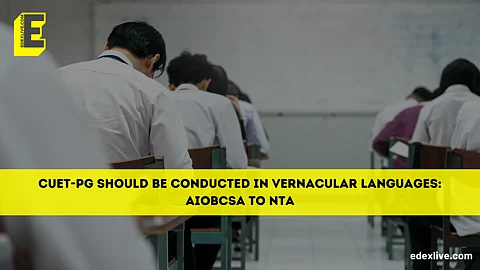

The All India OBC Students Association (AIOBCSA) has formally urged the National Testing Agency (NTA) to conduct the Common University Entrance Test for Postgraduate (CUET-PG) in vernacular languages, emphasising the need for inclusive education.
The association has submitted an official request to NTA Chairperson, Prof (Retired) Pradeep Kumar Joshi, highlighting the challenges faced by non-Hindi-speaking students in the existing bilingual format of English and Hindi on February 10.
AIOBCSA National President G Kiran Kumar stated that while exams like the Common Law Admission Test (CLAT) have embraced vernacular languages, CUET-PG, a crucial gateway for postgraduate admissions across major universities, continues to restrict language options.
"We have written to the NTA Chairperson and the Director General, pointing out that no mention of additional languages was made in the prospectus. Even though the application deadline has passed, no official communication has been issued regarding this," he said.
A fight for equal opportunity
The demand for vernacular language inclusion is gaining traction, with students from non-Hindi-speaking states voicing their concerns. Many feel that the current language policy gives an unfair advantage to those from English or Hindi-medium backgrounds, placing regional language students at a significant disadvantage.
Kiran Kumar further revealed that AIOBCSA has been receiving multiple complaints from students struggling with comprehension and subject-related questions due to the language barrier.
To escalate the issue, the association is reaching out to Members of Parliament (MPs), especially from non-Hindi-speaking states, and submitting letters to chief ministers to build political pressure.
"The New Education Policy (NEP) emphasises the importance of vernacular languages in fostering holistic development, but the reality at the grassroots level tells a different story. CUET-PG scores now play a critical role in postgraduate admissions across major universities, and the government must act to ensure a level playing field," he added.
AIOBCSA has also warned that if their demands are ignored, they will be forced to stage protests.
Students speak out
For students like Aparna Unnikrishnan, this change is not just about accessibility but also about the recognition of vernacular languages in the academic sphere.
"Introducing vernacular languages in CUET-PG will create a smoother academic journey for students from rural and backward communities. It is a progressive step towards inclusivity," she said.
Bhavna, another CUET-PG aspirant, echoed similar concerns. "CUET is a national-level exam, and students from all over the country are appearing for it. The inclusion of regional languages would ease the stress and ensure that no one has an undue advantage just because of their language background."
Will NTA respond?
Despite the growing demand, NTA has yet to release any official statement regarding the inclusion of vernacular languages in CUET-PG.
With pressure mounting from student bodies and political representatives, the ball is now in the agency's court.
